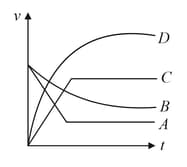Embibe Experts Solutions for Chapter: Viscosity and Surface Tension, Exercise 1: Exercise 1
Embibe Experts Physics Solutions for Exercise - Embibe Experts Solutions for Chapter: Viscosity and Surface Tension, Exercise 1: Exercise 1
Attempt the practice questions on Chapter 14: Viscosity and Surface Tension, Exercise 1: Exercise 1 with hints and solutions to strengthen your understanding. Physics Crash Course COMEDK UGET solutions are prepared by Experienced Embibe Experts.
Questions from Embibe Experts Solutions for Chapter: Viscosity and Surface Tension, Exercise 1: Exercise 1 with Hints & Solutions
Eight raindrops each of radius fall through air with terminal velocity What is the terminal velocity of the bigger drop formed by coalescing these drops together?
A ball is thrown downward with some velocity, greater than terminal speed into a viscous liquid. Which of the following curves represents correct variation for velocity versus time?

A ball of density and radius is dropped on the surface of a liquid of density from certain height. If speed of ball does not change even on entering in liquid and viscosity of liquid is then the height from which ball dropped is
A spherical ball is dropped in a long column of viscous liquid. The speed $v$ of the ball varies as function of time as
The work done in blowing a soap bubble of radius is surface tension of the soap solution is
The radii of two soap bubbles are and . In isothermal conditions, two meet together in a vacuum. Then the radius of the resultant bubble is given by:
The excess pressure inside an air bubble of radius just below (inside) the surface of the water is . The pressure inside a drop of the same size (radius) which is just outside the water surface is . If is the surface tension then
A capillary tube of the radius, is immersed in water, and water rises in it to a height, . Mass of water in the capillary tube is . If the radius of the tube is doubled, the mass of water that will rise in the capillary tube will now be
